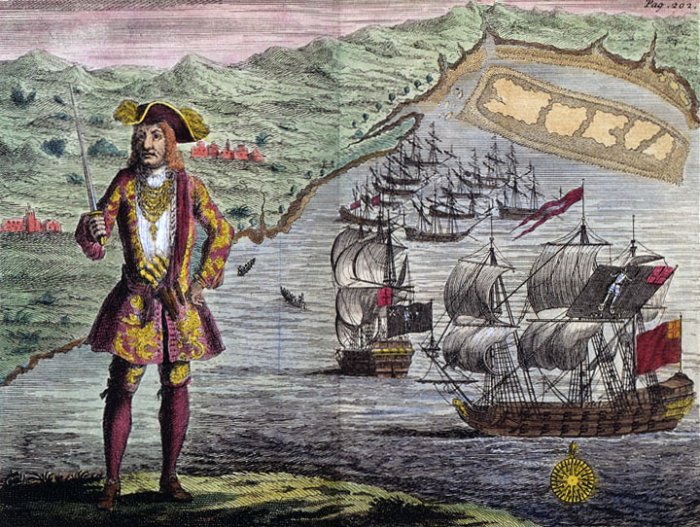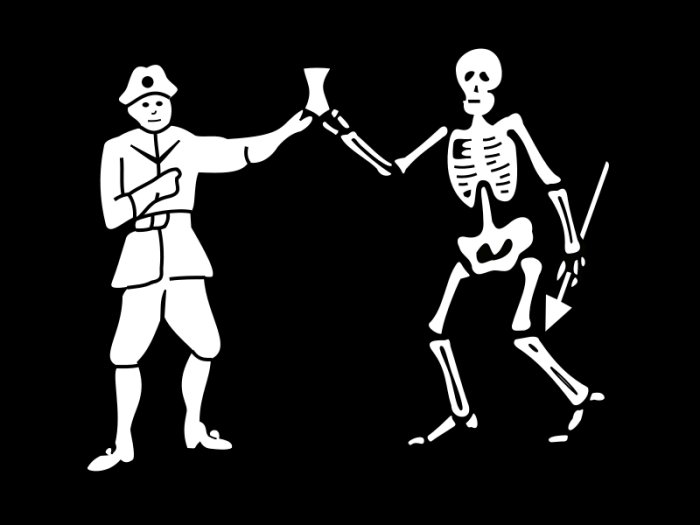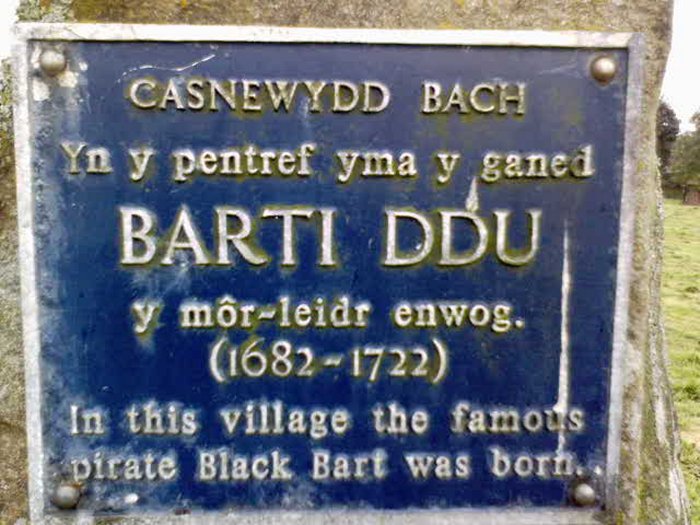Bartholomew Roberts Was Forced To Become A Pirate
Ellen Lloyd - AncientPages.com - Bartholomew Roberts never intended to become a pirate, but he had no choice. When his vessel was captured, he was forced into piracy. Having excellent navigation skills, courage and charisma, he was eventually recognized as the most successful pirate of the Golden Age.
The Golden Age of piracy spans from the 1650s to the 1730s. It was an intriguing and ruthless period in history when ships and the men and sometimes women who sailed them turned the oceans into an adventurous drama.
Captain Bartholomew Roberts, with two Ships, Viz the Royal Fortune and Ranger, takes in Sail in Whydah Road on the Coast of Guiney, January 11th. A copper engraving circa 1724. Credit: Public Domain
Bartholomew Roberts’ life was colorful and exciting. Between 1719 and he captured as many as 400 ships, including many superior warships! This made him the most wealthy and feared pirate of the Golden Age.
“His death and the trial of his crew in 1722 symbolized the end of piracy’s golden age.” 1
Who Was Bartholomew Roberts?
Born in 1682 in Casnewydd-Bach, Wales, Bartholomew Roberts, whose original name was John Roberts, went to sea at the age of 13.
Preparing for marine life, he continued sailing, and in 1719 he earned a position as the second officer on board the ship Princess under Captain Abraham Plumb. Welsh pirate Howell Davis captured his ship.
Roberts was enslaved and forced to bemuse one of the pirates. However, this did not bother him much because he soon realized this trade suited him well. Roberts was an attractive, tall man who enjoyed nice clothes and expensive jewelry. As a pirate, he had an opportunity not only to be famous but also rich.
“Pirate crews needed frequent replenishing. Most pirates were volunteers, but casualties from combat, disease, accidents and occasional desertions took their toll. So pirates took every opportunity they could to acquire new men. Since able seamen, maritime carpenters, coopers, and navigators were preferred, it was sensible for pirates to seek recruits from among the crews of the ships they took as prizes.
Pirates did not like risking injuries to themselves or their prizes, so the captains or owners of ships that ran or fought were frequently punished. For the rest of the men, pirates tried persuasion first.
In truth, merchant crews were often overworked, underpaid, and unhappy. Other arguments might include praise for the democratic life of piracy, the promise of better food, clothing and accommodation, liquor, and, of course, wealth. For the potential recruits to accept these reasons, the pirates themselves would need to be better dressed and nourished than them, which argues against the popular image of pirates as gaunt and ragged vagabonds.
Of course, if time was short or their arguments unconvincing, the pirates would then resort to force in order to fill out their crews.” 2
Bartholomew Roberts once said: “In an honest service there is thin commons, low wages, and hard labor. In this, plenty and satiety, pleasure and ease, liberty and power; and who would not balance creditor on this side, when all the hazard that is run for it, at worst is only a sour look or two at choking? No, a merry life and a short one shall be my motto.” 3
Time revealed Roberts’ boldness was one of the reasons he became more successful than other pirates.
Bartholomew Roberts’ New Life As a Pirate
Captain Howell Davis liked Roberts, and so did the rest of the crew. Once Davis discovered Roberts was an excellent navigator, he took consulting with him. In time, once Roberts gained Davis’ trust, the Captain could confide information to Roberts, keeping it hidden from the rest of the crew.
In June 1719, Davis and some of the pirates were killed in an ambush, and Roberts was selected as the new Captain.
Robert's new life as a pirate was entering another stage. Once he and his fellow pirates had avenged Davis’s death by destroying the harbor, they headed for the coast of South America to look for booty.
Roberts' first flag shows himself and Death holding an hourglass. Credit: Orem, CC BY-SA 3.0
Roberts was cunning and fooled many. He discovered 42 ships and their escorts were waiting at Saint's Bay off northern Brazil. Pretending he was just part of the convoy; he sailed into the bay and took one of the ships without anyone noticing. His eyes were set on the richest of the ships that he also captured quickly before the escorting ships had a chance to catch him.
In June 1720, Roberts, later known as Black Bart, captured 22 ships in the harbor, and then he and his crew continued to the Caribbean, where they captured dozens of vessels.
The Death Of Black Bart - Bartholomew Roberts
Roberts, who called himself the "Admiral of the Leeward Islands," had a couple of flags associated with him. One was a black flag bearing a skeleton, representing death, that held an hourglass in one hand and crossbones in the other. Another black flag with a white figure, representing Roberts, holding a flaming sword and standing on two skulls. Below were the words ABH and AMH, standing for "A Barbadian Head" and "A Martinico's Head."
Roberts hated the governors of Barbados and Martinique because they had sent pirate hunters after him. Whenever Roberts encountered ships from either place, he showed them no mercy.
Captain Bartholomew Roberts' memorial stone in Casnewydd Bach. Credit: Pbaiden, CC BY-SA 3.0
Roberts was a very successful pirate, but he could be extremely cruel. On one occasion, he ordered to burn Porcupine, a ship full of slaves, because its Captain had refused to pay the ransom.
In February 1722, Captain Challoner Ogle, who commanded the warship Swallow, put a stop to Roberts’ piracy. Ogle and his crew fought fiercely against Roberts and his pirates.
Roberts was killed by grapeshot, which struck him in the throat while he stood on the deck. His men fulfilled his wish and quickly threw his body into the sea.
The life of Bartholomew Roberts, the greatest pirate of his generation, had ended.
Roberts’s pirates were helpless without their Captain. They had only the energy to fight for one hour after his death. Then, they surrendered and were later put on trial.
Updated on August 30, 2022
Written by Ellen Lloyd – AncientPages.com
Copyright © AncientPages.com All rights reserved. This material may not be published, broadcast, rewritten or redistributed in whole or part without the express written permission of AncientPages.com
Expand for referencesMore From Ancient Pages
-
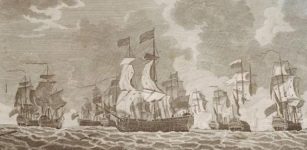 On This Day In History: Battle Of Lagos Took Place Between Royal Navy Of Britain and France – On August 19, 1759
News | Aug 19, 2016
On This Day In History: Battle Of Lagos Took Place Between Royal Navy Of Britain and France – On August 19, 1759
News | Aug 19, 2016 -
 Traces Of An Unknown Ancient Race Of Winged Beings And Other Mysterious Creatures Discovered In Japan
Civilizations | Nov 30, 2018
Traces Of An Unknown Ancient Race Of Winged Beings And Other Mysterious Creatures Discovered In Japan
Civilizations | Nov 30, 2018 -
 Clan MacGregor: Fearless, Lawless And Persecuted Clan Of The Highlands
Featured Stories | Jul 9, 2018
Clan MacGregor: Fearless, Lawless And Persecuted Clan Of The Highlands
Featured Stories | Jul 9, 2018 -
 Venus Cloacina: Roman Goddess Of Sewers And Drains
Featured Stories | Dec 19, 2019
Venus Cloacina: Roman Goddess Of Sewers And Drains
Featured Stories | Dec 19, 2019 -
 Ancient History Of The Christmas Tree And Its Pagan Roots – How The ‘Forbidden’ Tree Survived Against All Odds
Christmas Traditions | Dec 24, 2024
Ancient History Of The Christmas Tree And Its Pagan Roots – How The ‘Forbidden’ Tree Survived Against All Odds
Christmas Traditions | Dec 24, 2024 -
 Thousand-Year-Old Farming Techniques And Irrigation Systems Can Be Used To Mitigate Climate Change
Archaeology | Mar 7, 2018
Thousand-Year-Old Farming Techniques And Irrigation Systems Can Be Used To Mitigate Climate Change
Archaeology | Mar 7, 2018 -
 Biblical Event Verified By Study Of Earth’s Magnetic Field?
Archaeology | Jan 4, 2024
Biblical Event Verified By Study Of Earth’s Magnetic Field?
Archaeology | Jan 4, 2024 -
 Great Pyramid Puzzle: ‘Lost’ 5,000-Year-Old Piece Of ‘Dixon Relics’ Accidentally Found
Archaeology | Dec 17, 2020
Great Pyramid Puzzle: ‘Lost’ 5,000-Year-Old Piece Of ‘Dixon Relics’ Accidentally Found
Archaeology | Dec 17, 2020 -
 Mysterious Ancient Tomb May Contain Remains Of A Powerful Forgotten Goddess
Civilizations | Aug 30, 2018
Mysterious Ancient Tomb May Contain Remains Of A Powerful Forgotten Goddess
Civilizations | Aug 30, 2018 -
 Ancestral Home Of All Humans Revealed Through World’s Largest Genome Reconstruction Of Our Ancestors
Archaeology | Jan 3, 2023
Ancestral Home Of All Humans Revealed Through World’s Largest Genome Reconstruction Of Our Ancestors
Archaeology | Jan 3, 2023 -
 Underground Ancient City Of Kish And Its Advanced Hydraulics System
Ancient Technology | Aug 28, 2015
Underground Ancient City Of Kish And Its Advanced Hydraulics System
Ancient Technology | Aug 28, 2015 -
 ‘Impossible’ Advanced Ancient Technology In Mesopotamia – Evidence Of Other-Worldly Interaction?
Featured Stories | May 24, 2021
‘Impossible’ Advanced Ancient Technology In Mesopotamia – Evidence Of Other-Worldly Interaction?
Featured Stories | May 24, 2021 -
 Ancient Jaintia Kingdom And The Garden Of Monoliths And Dolmens
Featured Stories | Nov 8, 2016
Ancient Jaintia Kingdom And The Garden Of Monoliths And Dolmens
Featured Stories | Nov 8, 2016 -
 Årsgång – Year Walk In The Forest – Mystical Journey To Gain Knowledge About The Future – An Ancient Swedish Ritual
Ancient Traditions And Customs | Jan 1, 2025
Årsgång – Year Walk In The Forest – Mystical Journey To Gain Knowledge About The Future – An Ancient Swedish Ritual
Ancient Traditions And Customs | Jan 1, 2025 -
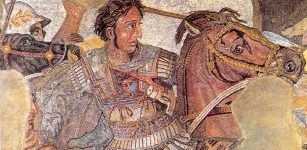 How Did Alexander The Great Die?
Featured Stories | Apr 9, 2016
How Did Alexander The Great Die?
Featured Stories | Apr 9, 2016 -
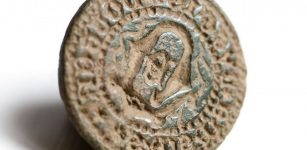 Unique Seal Stamp That Belonged To Elisabeth Buggesdatter, One Of The Most Powerful Women In Denmark – Discovered
Archaeology | Dec 19, 2018
Unique Seal Stamp That Belonged To Elisabeth Buggesdatter, One Of The Most Powerful Women In Denmark – Discovered
Archaeology | Dec 19, 2018 -
 Lost Ancient Greco-Bactrian Kingdom Of 1,000 Cities
Civilizations | Apr 23, 2016
Lost Ancient Greco-Bactrian Kingdom Of 1,000 Cities
Civilizations | Apr 23, 2016 -
 Underwater Artifacts Shed New Light On Battle Of The Egadi Islands Between Romans And Carthage
Archaeology | Dec 16, 2020
Underwater Artifacts Shed New Light On Battle Of The Egadi Islands Between Romans And Carthage
Archaeology | Dec 16, 2020 -
 Excavations of the Aşıklı Mound, Cappadocia , Turkey
Civilizations | Aug 22, 2015
Excavations of the Aşıklı Mound, Cappadocia , Turkey
Civilizations | Aug 22, 2015 -
 Seti I – Remarkable Pharaoh Who Saved The Kingdom Of Egypt And Gave It New Glory
History | Jun 15, 2021
Seti I – Remarkable Pharaoh Who Saved The Kingdom Of Egypt And Gave It New Glory
History | Jun 15, 2021

